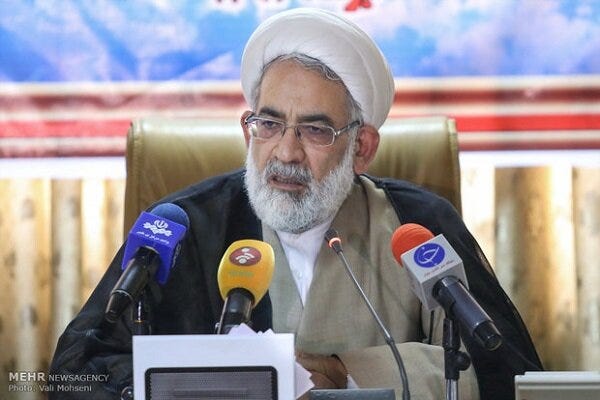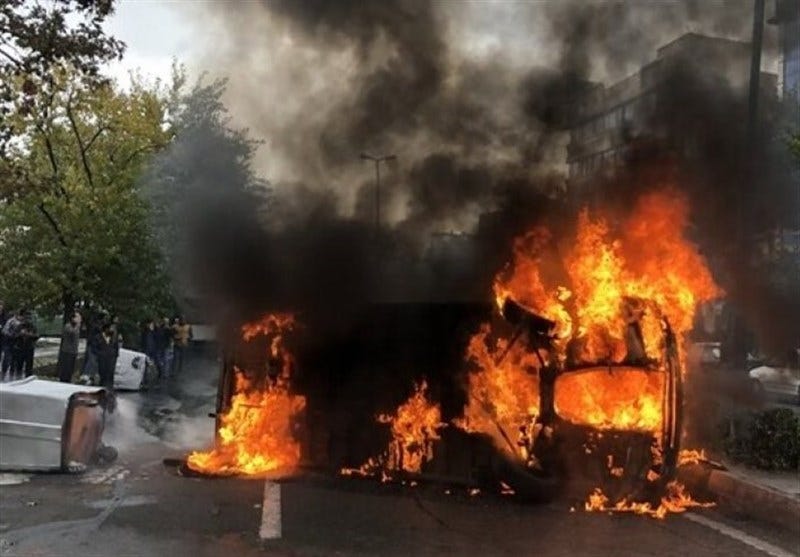Did Iran abolish the (morality) police? No. Well, sort of.
Iran’s attorney-general admitted to a de facto change, not a new policy.
Something surreal happened last night. I was staring at a TV playing Al Jazeera, which was reporting that Iran’s “morality police” had been abolished. In my hands, my phone was open to an article from Iranian official media declaring that the Guidance Patrol had definitely not been abolished.
So what was happening?
Iranian authorities have slackened in their enforcement of dress codes and other morality laws over the past two months of unrest. At a press conference two days ago, attorney-general Mohammad Jafar Montazeri appeared to admit off-the-cuff that the infamous Guidance Patrol was no longer running.
Montazeri is not in charge of the Guidance Patrol, but he is a senior official, so it was newsworthy that he made a statement about it on the record. Then a game of telephone started, as international outlets stretched the initial newswire reports about Montazeri’s press conference.
Al Jazeera, for example, translated Agence France-Presse’s translation of the news conference from English or French into Arabic. Dragged across three languages, Montazeri’s words sounded less like a bureaucrat deflecting questions, and more like a major policy rollout.
The misinformation was a mirror-image of an earlier rumor that had spread. Last month, international media mistakenly reported that Iran was going to execute 15,000 prisoners. Again, foreign journalists had stretched statements beyond their meaning, and misunderstood who is responsible for what in the Iranian government.
This time around, the misinformed coverage had an optimistic rather than pessimistic tone. All the same, it will contribute to Iranians’ feeling that foreign media is not accurately representing their reality. The inevitable fact-checks will probably also contribute to some foreign audiences becoming jaded and tuning out news from Iran, just as the story about 15,000 prisoners did.

The current unrest began after Kurdish woman Mahsa Jina Amini died in the custody of the Guidance Patrol, often known as the “morality police.” Her death sparked two months of protests against theocracy, as well as heavy uprisings by Iran’s Kurdish and Baluch minorities. Police have killed hundreds of people and arrested thousands.
The government has quietly given ground on the issue of morality policing. The infamous green Guidance Patrol vans have disappeared from the streets. State media now celebrates women without hijab. Official committees have formed to explore the issue of Islamic dress codes. Purged Reformist figures are being brought in from the cold. Et cetera.
A viral video showed Iranians going about their business in an upscale Tehran mall this weekend as if the dress code doesn’t exist, with some women wearing hijab and some letting their hair down. It was captioned “Tehran has turned into Europe!”
Maybe not Europe, but certainly any Muslim country without morality police, like Turkey or Jordan.
Even though they recognize that morality policing is a lost cause, Iranian authorities are loath to admit it. Their mentality is to never show weakness towards the streets, a lesson they learned from the 1979 revolution that brought them to power, as well as the 2011 revolution in Syria that they helped put down.
That’s why Montazeri gave the non-answer of non-answers. At a press conference, a reporter asked him why the Guidance Patrol vans were no longer running. Montazeri said:
The Guidance Patrol has no relationship to the Judiciary, and it was shut down from the same place it had been founded in the past.
Ah, the good old passive voice. Any journalist who’s dealt with a government official speaking on the record can see what’s happening here. Excuse the language, but Montazeri was covering his own ass. He washed his hands of the issue without putting the blame on any specific colleague who could cause him trouble.
That little maneuver might have caused more trouble than Montazeri expected. He put it on the record that the Guidance Patrol was “shut down,” something that the people in charge had been keeping ambiguous.
Agence France-Presse only partially translated the quote: “Morality police have nothing to do with the judiciary and have been abolished.” Suddenly it looked less like passing the buck to another agency, and more like a declaration of policy.
Montazeri had said تعطیل in Persian, an Arabic loanword that implies a temporary shutdown. (Amwaj News translated it “standstill.”) But based on Agence France-Presse’s report, Al Jazeera reported his comment in Arabic as قد جرى حلُّها, or “it has been dissolved.”
State media quickly walked back the comments. Al-Alam reported:
In a statement responding to a question, the Attorney-General said, “the Guidance Patrol has no relationship to the Judiciary, and it was shut down from the same place it had been founded in the past.”
This statement by the Attorney-General was made while no official in the Islamic Republic of Iran has confirmed the shutdown of the Guidance Patrol.
The most that can be taken from the cleric [حجة الإسلام] Montazeri’s words is that the Guidance Patrol has had no relationship with the Judiciary since its establishment. As the Attorney-General emphasized, the Judiciary will continue its monitoring of social behavior.
Some foreign media have tried to present this statement by the Attorney-General as a retreat by the Islamic Republic from the issues of modesty and chastity, one affected by the recent disturbances.
That, too, is spin. The Islamic Republic has retreated on “modesty and chastity,” and that retreat was affected by the “recent disturbances.” Regardless, the message is clear: the changes will not be made official, especially if they look like a concession under international pressure.
Many opposition activists have emphasized that shutting down the morality police is not enough to quell popular discontent. The protests have unleashed grievances way beyond the dress code, and chants in the street are pointedly calling for revolution rather than reform.
But slogans are not the whole story. Turnout at protests does seem to be spiraling lower and lower over the past few weeks.
It’s hard to tell how much of the decline is a change in mood versus temporary fatigue. Someone in Esfahan tells me that “people are burned out.” Even without the fear of torture and killing, protesters do get tired. And the weather is getting colder.
There is now a call for a general strike from December 5 to December 7. Some of the images suggest that downtown areas across Iran are shut down. The next three days will be a major test of whether the opposition can continue to mobilize Iranians to the same degree as before.
Whatever happens, it’s clear that there is no going back to before September 2022. The balance of fear between young women and the authorities has permanently shifted.





